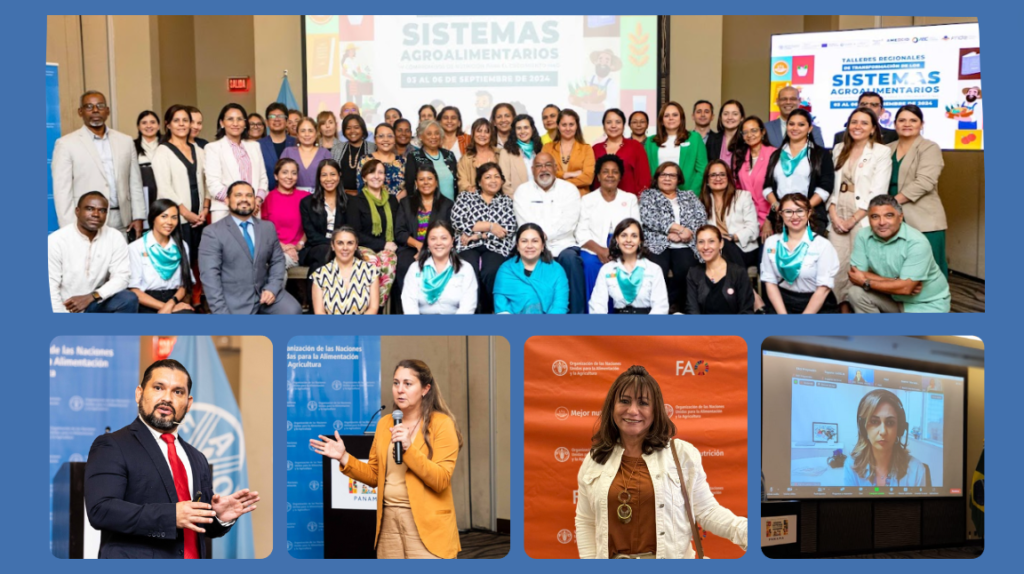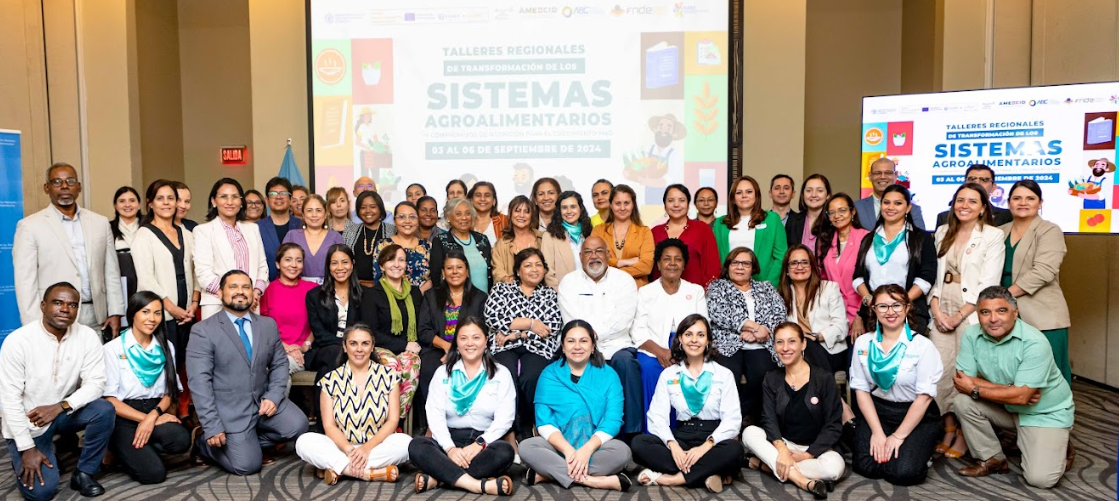Countries in Latin America and the Caribbean (LAC) came together for a regional dialogue aimed at advancing sustainability throughout the agrifood system, making it more sustainable and nutrition-sensitive. They proposed adopting the food-based dietary guidelines (GABSA) as a key measure to achieve food security, the right to food, improved nutrition, and ensure access to fresh, locally produced foods, and, above all, healthy diets for all people, leaving no one behind.
Brasília, Brazil, September 6, 2024 – Representatives from the Sustainable School Feeding Network (RAES) delivered two presentations on sustainable school feeding at the international event ‘Regional Workshops on Agrifood Systems Transformation and Nutrition Commitments for Growth-N4G,’ which took place in Panama City, Panama, from September 3 to 6.
RAES is a strategy developed by the Brazilian Cooperation Agency (ABC), the National Fund for Educational Development (FNDE), and has the executive secretariat of the Food and Agriculture Organization (FAO).
The first presentation was by Karine Santos, Coordinator of Brazil’s National School Feeding Programme (PNAE), who explained the work carried out through the Brazil-FAO International Cooperation on school feeding since 2009. “Through the RAES Network, we can support the development of a more resilient, more inclusive food system, more committed to mitigating the effects of climate change. And with more capacity to change that food culture,” said Karine Santos.
Najla Veloso, Coordinator of the Regional Agenda for Sustainable School Feeding in LAC, conducted a dynamic session with two questions for participants: one asked, “How can national food-based dietary guidelines be linked with school menus?” and the other asked, “What are the effective contributions of school feeding programmes (SFP) to mitigating the effects of climate change?”

At the end of the event, she emphasized that SFPs are important strategies for achieving better nutrition and making an impact in the pursuit of sustainable agrifood systems from economic, social, and environmental perspectives, especially through the adoption of healthy menus, multiple actions in food, nutritional and environmental education, and public procurement of fresh, local, environmentally sustainably produced foods. “For all these reasons, it is fundamental that countries remain connected, engage in ongoing dialogues, and make decisions to address the many challenges we still face in our region, underscoring the importance of their formal adherence to RAES through the signing of the Declaration of Commitments with the advances of the SFPs in LAC.”
Israel Ríos, FAO Nutrition Officer, highlighted the importance of nutrition for achieving a true transformation of agrifood systems in the region. He said that the world faces a “perfect storm” exacerbated by climate change, loss of food biodiversity, and high rates of malnutrition, particularly obesity and non-communicable diseases. “All of this moves us away from the goals set out in the 2030 Agenda. Achieving a world free from hunger requires innovative, creative measures that integrate a systemic approach to ensure that the most vulnerable have access to healthy diets,” stated Dr. Ríos.
Daniela Godoy, FAO Senior Policy Officer, presented the CELAC 2030 Food Security, Nutrition, and Hunger Eradication Plan. She noted that the plan includes successful food security policies and initiatives developed in the region and serves as a roadmap for advancing towards hunger eradication in the region. She also presented the three pillars of the plan: i) strengthening legal and institutional frameworks and macroeconomic and trade policies; ii) promoting sustainable production, food supply, and access to food; and iii) ensuring affordability and consumption of healthy diets for the entire population.
About the Workshops
The event was a joint effort between FAO, the Scaling Up Nutrition (SUN) Movement, the EU4SUN cooperation project, funded by the European Commission and implemented by the International and Ibero-American Foundation for Administration and Public Policies (FIIAPP). Additionally, it was co-organized by the Mesoamerica Hunger-Free Program AMEXCID-FAO, a joint initiative of the Mexican Agency for International Development Cooperation (AMEXCID) and FAO; and by the Sustainable School Feeding Network (RAES), promoted by the International Cooperation of the Brazilian Government and FAO in School Feeding.
The event was inaugurated by Beatriz Carles, Minister of Social Development (MIDES) of Panama; Francisco Ameglio, Minister in the Ministry of Agricultural Development (MIDA) of Panama; Laura Suazo, Secretary of State in the Departments of Agriculture and Livestock of the Republic of Honduras; Brieuc Pont, Secretary-General of the Nutrition for Growth Summit, delegated by the French Ministry of Foreign Affairs; Adoniram Sanches Peraci, Subregional FAO Coordinator for Mesoamerica; and Karen Holder, Director of Health Provision at the Ministry of Health (MINSA) of Panama.
Hunger in the Region
In a video conference greeting, FAO Deputy Director-General and Regional Representative for LAC, Mario Lubetkin, noted that in a world where 2.33 billion people do not have access to sufficient nutritious and safe food, and 187.6 million people live with moderate to severe food insecurity in LAC, achieving sustainability in the production, processing, transportation, marketing, and consumption of food is of great importance.
Adoniram Sanches Peraci explained that sustainable agrifood systems have the capacity to address water scarcity, respond to climate change, and protect global food biodiversity. Furthermore, he explained that these systems would ensure sustainable economic growth and decent employment in rural areas, provide affordable food supplies in cities, and significantly contribute to ending hunger— an achievement that can only be realized in partnership with all stakeholders in food and agriculture.







